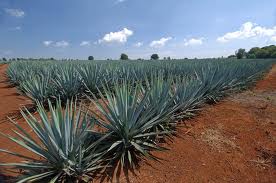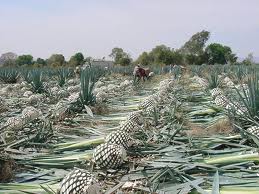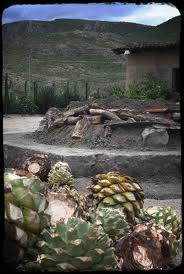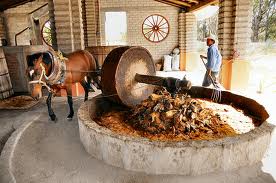I first published this post in 2012. At the time, mezcal was little known. And while the battle for recognition is still uphill, mezcal is far more popular today than it was back then. Since 2012, mezcal sales are up almost four times, and the vast majority of bars, restaurants and liquor stores, carry at least one brand.
I still spend a lot of time spreading the gospel of mezcal, and more times than not, the conversation begins with the comparison of mezcal to tequila. I use it as an opener at cocktail parties. I just walk up to a random person and ask them “Do you know what the difference is between tequila and mezcal?” They usually turn and walk away. OK, maybe that is not the way it goes down, but it could happen that way!
But this question usually is the starting point when people are curious about mezcal. In many ways, mezcal can best be understood by simply tasting it next to tequila. What will you find? Most notably, you will find mezcal to be smoky by comparison. Intense and smoky like a campfire to some, or subtle and gentle to others. The person who finds the smoke to be light is usually a scotch, bourbon or whiskey drinker, and is used to bold spirits. If you find mezcal to be intensely smoky, there is a good chance you are not accustomed to drinking spirits neat.
This post gives you the basics, but if you really want to understand and appreciate what separates mezcal from tequila, you need to read my book Holy Smoke! It’s Mezcal! (shameless self-promotion perhaps, but hey, the blog is free so this is my form of selling ad space!). The book is available on Amazon. Notice the cool cover shot to the right. Buy a copy – I promise you won’t be disappointed! Now back to our regularly scheduled program…
I believe that for most people tequila leads to mezcal (even though all tequilas are mezcals, but we will come back to that). Tequila leads to mezcal because for most of us, it started with tequila. We traveled down a path that likely started with bad tequila, bad experiences, and bad results the next morning. Then we slowly found our way back to the good 100% agave tequilas that started showing up in the 90’s. And maybe we enjoyed the extra anejos that move tequila toward cognac. And then, what? What else is out there? Ahhh mezcal….I’ve heard about that. The rise of the extra anejos coincided with the arrival of fine mezcals and then they started to appear on the shelves at your local liquor store and on the cocktails menus of your favorite gin joints. So tequila brought us to this point and now mezcal joins the discussion….
There are three key reasons why mezcal is different from tequila:
- Tequila and mezcal are produced in different states of Mexico (though there is overlap).
- Tequila can only be made, by law, with one variety of agave: the Blue Agave. Mezcal can be made with upwards of 50 varieties of agave, though most are made with the Agave espadin.
- The production process for mezcal is different from tequila which leads to a distinctly different flavor profile for mezcal.
Tequila and Mezcal are Produced in Different Regions
First, you must know that all tequilas are mezcals. Mezcals are any agave-based liquor, and therefore tequila is a subset of mezcal produced in specific regions of Mexico and made only from the Blue Agave. Tequila is made in 5 specific regions: Jalisco, Michoacan, Guanajuato, Nayarit, and Tamaulipas. Jalisco is definitely the center of the tequila universe and where the town of Tequila (yes, there is a town named Tequila) is located.
Mezcal is made in 9 specific regions of Mexico: Oaxaca, Durango, Guanajuato, Guerrero, San Luis Potosi, Tamaulipas, Zacatecas, Michoacan, and Puebla. Oaxaca is the center of the mezcal world, as about 80%% of mezcals are made in Oaxaca. In the summer of 2018, 3 new states were provisionally approved to produce mezcal (México, Aguascalientes, and Morelos). The extension of the mezcal Denomination of Origin to these states is currently being challenged, so they may or may not make it to official status.
Tequila and Mezcal are Made From Different Varieties of Agave
Tequila must be made from the Blue Agave. Mezcal, on the other hand, can be made from more than 50 varieties of agave, including the Blue Agave. See my previous post on How Many Agave Varieties Can Be Used To Make Mezcal for a lengthy, and some say fascinating (maybe that’s just me) discussion. But know that most mezcals are made from the Agave Espadin, which is the most prevalent agave variety found in Oaxaca.
The Production Process is Different
You’ve seen agave plants, right? They have these long spear-like leaves. At harvest, the leaves are sheared off by the jimador (the person doing the harvesting) who uses a coa, a long-handled stick with a sharp, flat blade at the end. Once the leaves are off, what is left is called the “pina” because it looks like a large pineapple.
They have these long spear-like leaves. At harvest, the leaves are sheared off by the jimador (the person doing the harvesting) who uses a coa, a long-handled stick with a sharp, flat blade at the end. Once the leaves are off, what is left is called the “pina” because it looks like a large pineapple. 
Up until this point, a tequila harvest and a mezcal harvest is essentially the same (with different varieties of agave). How the pina is cooked is where the process differs dramatically.
With tequila, the pinas are cooked in large industrial ovens, known as autoclaves, which are large, stainless-steel industrial pressure cookers. (note: there are other methods of cooking and crushing the pinas but this is the most common). Then the cooked agave is shredded and fermented blah blah blah. So uninteresting. So industrial. So mass production. So boring! (Can you feel the mezcal bias brewing?)
With artisanal mezcal, the process is much more handcrafted and follows the process that has been used for hundreds of years. I stress the word “artisanal” because some mezcals, like Kimo Sabe (which sucks, by the way), use a very industrial process much like a mass-produced tequila. But the premium mezcals, which I regularly discuss on this blog, use the traditional production method. With artisanal mezcal production, the pinas are cooked in an underground, earthen pit. The pit is typically about ten feet wide and t en feet deep, and cone-shaped down to the bottom. It is lined with volcanic rock. A fire is started in the bottom with wood. This fire burns to the embers heating the volcanic rocks to extreme heat. The pinas are then piled into the pit and covered with about a foot of earth. This underground “oven” now smokes, cooks and caramelizes the pina over a multi-day cooking process. The picture on the left here shows a covered pit and the pinas are cooking beneath the earthen mound. The pinas in the foreground are for show (or perhaps, they are just happily waiting their turn at glory to be smoked and turned into glorious mezcal!). It is largely this underground baking process that imparts the smoky flavor to a mezcal.
en feet deep, and cone-shaped down to the bottom. It is lined with volcanic rock. A fire is started in the bottom with wood. This fire burns to the embers heating the volcanic rocks to extreme heat. The pinas are then piled into the pit and covered with about a foot of earth. This underground “oven” now smokes, cooks and caramelizes the pina over a multi-day cooking process. The picture on the left here shows a covered pit and the pinas are cooking beneath the earthen mound. The pinas in the foreground are for show (or perhaps, they are just happily waiting their turn at glory to be smoked and turned into glorious mezcal!). It is largely this underground baking process that imparts the smoky flavor to a mezcal.
The artisanal mezcal process continues once the pinas are cooked and unearthed. The crushing process for the agave is traditionally done with a tahona (pictured here). Yes, it is a horse or donkey pulling a large stone wheel around in a circle. You see the cooked agave being crushed in the center of the wheel. This is cool, hand-crafted stuff! This entire process basically happens on a farm (or “palenque”) and is overseen by a Master Mezcalero. So when you see a premium mezcal for $50, $100, or even $200 a bottle, know that you are paying for a bottle of drinkable art that has been made this way since the 1600’s. And if someone says, “I can’t believe you paid $100 for a bottle of mezcal!” Just smile, pat them on the head, and call them grasshopper.
crushing process for the agave is traditionally done with a tahona (pictured here). Yes, it is a horse or donkey pulling a large stone wheel around in a circle. You see the cooked agave being crushed in the center of the wheel. This is cool, hand-crafted stuff! This entire process basically happens on a farm (or “palenque”) and is overseen by a Master Mezcalero. So when you see a premium mezcal for $50, $100, or even $200 a bottle, know that you are paying for a bottle of drinkable art that has been made this way since the 1600’s. And if someone says, “I can’t believe you paid $100 for a bottle of mezcal!” Just smile, pat them on the head, and call them grasshopper.
So that, my friends, is why mezcal is different than tequila at a basic level. Of course, there is much more to it if you start talking about culture, history, CRM vs. CRT, and the list is longer still. But the above list of three key differences will have you more informed than 99% of the population.


There are so many brands so tequila that most of us are not aware of but they are really good. You should really read this blog which tells all the good brands out there for tequila.
[…] is a type of mezcal, much like how scotch and bourbon are types of whiskey. According to spirits writer John McEvoy, mezcal is defined as any agave-based liquor. This includes tequila, which is made in specific […]
Zignum not that bad dude
If you like tequila, that is probably true. But Zignum does not taste like a mezcal, nor is it produced in an artisanal fashion. It is an industrially produced spirit, and I also don’t like the fact that they are using the limited resource of agave to mass produce it. But if you like, drink it. Just understand what it is.
I’m interested. I was just in Queretaro, MX and was given a bottle of Amores Mezcal and also some Gusano salt. I was told to slice an orange, sprinkle the gusano salt on the orange and do the shot of mezcal with the orange covered in “agave worm” salt, uhm, I mean gusano salt. It is supposed to be “delicious” and I can’t wait to try it. I noticed talk about a lot of things on this blog but nothing about gusano salt and mezcal. So professor, can you share some of your knowledge about the combination of Mezcal and Gusano salt? What’s the right balance of each to take me to the next higher than tequila level?
I have a chapter in the new book about salt, the worm and mezcal if you want to learn more. But basically, you can dip the orange slice into a small pile of the sal de gusano, and eat the orange. The sal de gusano is essentally a spicy salt, and it is yummy! They say to use it as a palate cleanser between sips (sip, never shoot, good mezcal). I am not sure it really achieves cleansing as you are left with a spiciness in your mouth. But I tastes good so why not!
Hello there,
I’m looking to introduce Mezcal to a market that knows absolutely nothing about it, what do you recommend i should start with, what are the brand that i should consider ?
Thanks
I think low smoke mezcals are likely to work best. Brands like Ilegal and El Buho are lovely and can be sipped or put in a cocktail. A mezcal margarita is always a great gateway drug! Good luck!
Great article and thanks for sharing your knowledge! I have only done a sampling of different mezcals at a local bar/restaurant called Teote and I was quite impressed with them. I’m curious if you’ve tried Casamigo’s new Mezcal and how it is. I love Casamigo’s anejo tequila and is why I’m asking. I’m wanting to buy my first mezcal bottle soon and want it to be a good one! Thanks!
Thanks for writing! The Casamigos Mezcal is disappointing and I would not recommend it. There are many good mezcals for $20 less. Try Ilegal Joven if you are looking for a good first mezcal to buy. It is also a good second mezcal, third mezcal, etc! They also have an Anejo which you may love but it is about $100…..
Will you people PLEASE STOP THE B—–IT. It really depends on how and with what the agave plant is cooked in the beginning of the process, and exactly which variety of agave plant is being used for the mezcal etc. The tequila must use blue agave.
I have no idea what BS you are talking about. If you can politely elaborate I am happy to engage.
I had my first Mezcal maybe 20 years ago, a Don Amado, and it was gloriously smokey. I am finding the present day Mezcals are barely smoky in comparison. Most likely the processing has been modified for the US market. Don Amado admits as much by indicating they steam after the underground roasting (?). Another flavor dilution by the rich yankees? I wish I had bought a warehouse of Don Amado back then! Sob!
There are many great mezcals out there these days. You are right that most are not overly smokey. I personally do not like a heavily smoked mezcal because I feel it masks all the other great flavors that are going on. I find Sombra and the Del Maguey Chichicapa to both be pretty smokey if you are looking for it. Thanks for writing in!
We have ancestral mezcal from Michocan. Would you be interested in reviewing them? We have Joven, Reposado and Anjeho…..
Thank you for offering. I generally do not do reviews. Sometimes I am inspired and I write about brands I try. Or I am likely to at least acknowledge a gift on Instagram, FB, and Twitter. But I cannot promise anything. I appreciate the outreach at any rate!
[…] there, such as the National Museum of Anthropology or the Chapultepec, but have you tried mezcal? Mezcal is the city’s liquor of choice. That has been the case since 2005, when the mezcaleria La Botica […]
[…] instead of my good ol’ friend tequila, I was intrigued. For those who are thinking, “what the fuck is mezcal?!” it’s quite different from tequila, although they are both made from agave, mezcal has […]
wow – it was a discussion about the differences in Mezcals and Tequila and now we are exploiting animals who provide labor to produce them.
First let me say we as humans have dominion over animals. An animal who is made to pull is happiest pulling. I grew up in Southwest Georgia and had some animal activist attack me while I was stopped for gas when she saw the briar scratches on my Pointer’s underbelly and the raw tail tip bleeding. What said activist does not understand is that a bird dog (in this case a short-haired Pointer) is happy hunting birds. They do not suffer a bit from briars and the inconvenience they present. They live and breath for the next time they can be taken out into the field. The saddest bird-dog is the one you’ll see when its owner has become so consumed by their work life that their free time suffers and the bird dog is never taken out into the briary-filled woods where it is at its most perfect existence. That mule is happier being handled daily and having a Mezcaleros pat it while walking around the tahona. When animals can hire lawyers, read, write, vote, and do homework, I’ll escalate them to the level of human. Until then, get over it.
Well said and funny conclusion!
I’m no animal activist, but you’re talking rubbish. ‘Humans have dominion over animals’? – Says who? What humans do have, is a responsibility to protect other animals from the careless and destructive activities of our own species, whether they be domestic or wild.
This part of the thread has gone astray. It started because someone suggested that mezcal is not vegan because a horse may have pulled tahona that crushed the cooked agave. That is a bit ridiculous. But maybe we should just let it all rest. On the dominion c.omments, I think you are both right. Animals work for us not the other way around, but that does not mean we do not have a responsibility toward them
In sum, this is a mezcal blog not an animal rights blog…..know what I mean? So can we leave it here and move on??!!
Great story. Your book will be in my library. Godspeed amigo.
Thanks!
[…] to smoke for days on end. John McEvoy, author of “Holy Smoke! It’s Mezcal” and blogger of MezcalPhd explains “this underground ‘oven’ now smokes, cooks, and caramelizes the pina over a […]
[…] mezcal is not tequila, tequila is mezcal — don’t be confused: what’s the difference? […]
[…] three main differences between tequila and mezcal can also be found in his blog post: Tequila vs. Mezcal. The book continues to cover mezcal production, the use of different agave varietals, and key […]
Thank you for a well written and factual piece. Any history about why Mezcal started being made in the 1600s would be awesome. Did it come from Spain? Was this an indigenous product?
It’s a long story and it’s all in the book! Buy it on Amazon: Holy Smoke! It’s Mezcal! Thanks for writing in….
[…] To learn more about Mezcal check out this great article by Mezcal PHD […]
My takeaway is that mezcal is not considered vegan in that the labor of an animal is used to produce it.
Ahhh OK. But not everyone use animals (donkeys, horses, etc). Some use mechanical crushers and others have mechanized their tahonas, while still others crush by hand with mallets. If vegan mezcal is important to you, those brands exist that don’t use animals….
Nothing against veganism and I suppose the following depends on ones definition of ‘animal’, but couldn’t one argue that humans/Master Mezcaleros are animals too?
In addition, could Mezcal (or any other hand crafted product) than be considered some level of cannibalism?
My apologies for furthering the tangent.
I think you have gone off the rails. Mezcal is cannabalism because it is made by humans? I think it is time to move on!
So if I use a mule to pull my tiller for my garden, my carrots are not vegan? You don’t have access to sharp objects, do you??
Thank you Donald for being the voice of reason among this “Vegan” bullshit!
Just live mezcal.
Love it love be it love it
[…] goodness moment. Told you, I’m a total sucker… To read more about Mezcals, check out MEZCAL PhD Today’s cocktail muddles fresh Hothouse cucumbers (the only kid worth buying at the grocery […]